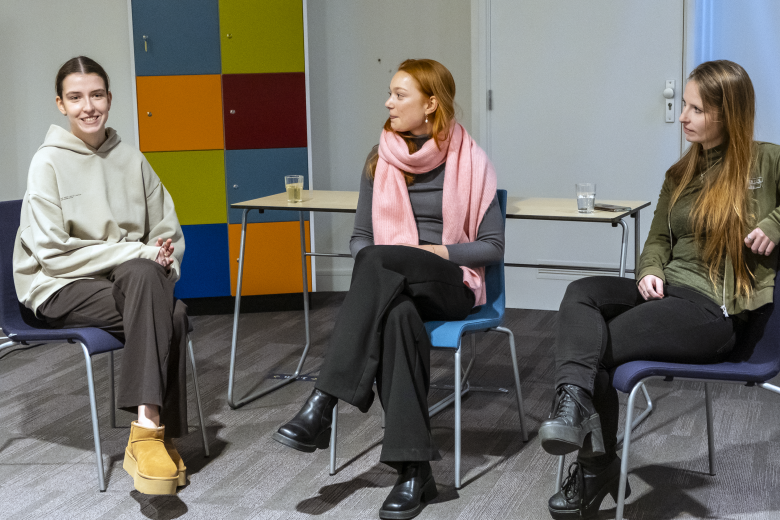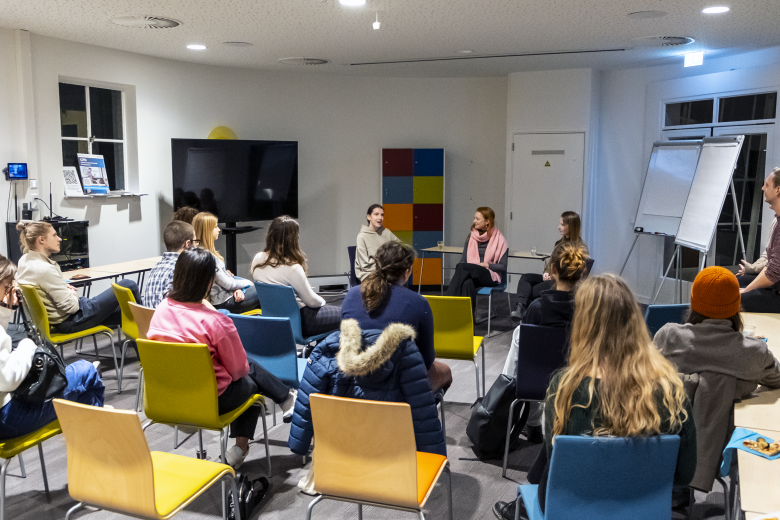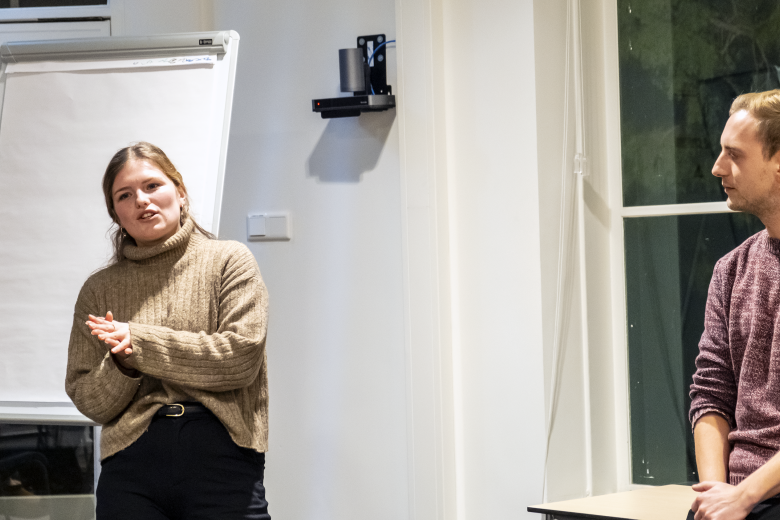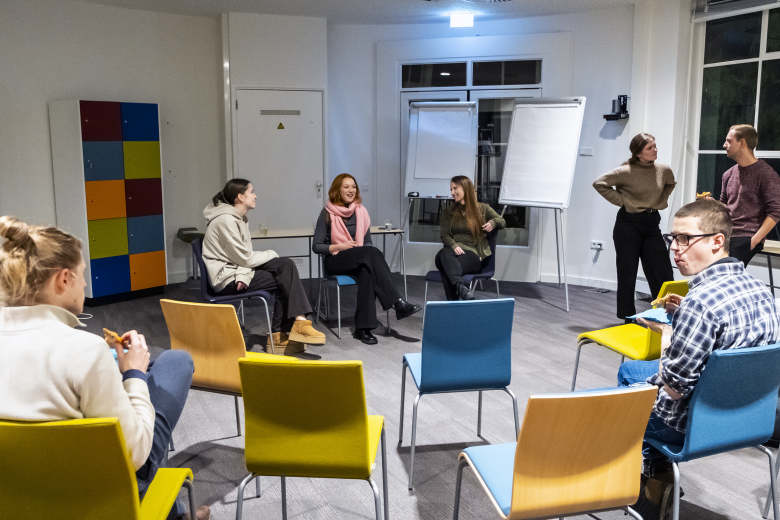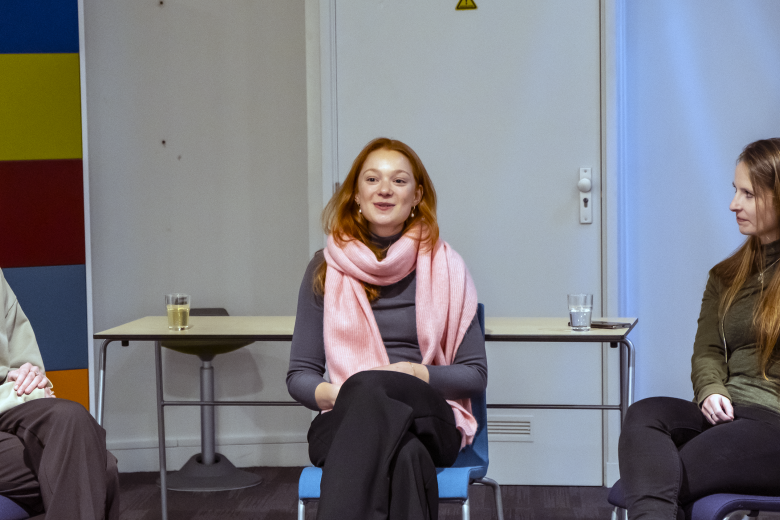Growing through failure: insights from EDLAB’s 10th Student-Meet
“We should want to fail because failing allows us to grow. Once you fail, you realise the monster has no teeth,” Maxime Verwoert told the student audience at EDLAB’s 10th Student-Meet on 22 November 2023. During the event “Embrace your Fears and Dare to Succeed,” three resilient students shared their views on failure and the fear of failure.
Their main take-home message? If you are afraid of failing, you are not alone. Failure is a natural experience that everyone struggles with sometimes. Although it might seem daunting, it is manageable. In fact, it can be a necessary stepping-stone for growth.
Photo impression of the event
To fail or not to fail?
EDLAB’s Student-Meets provide an opportunity for students to share their experiences on a given topic. This special Student-Meet edition was organised in collaboration with the Maastricht University Wellbeing Movement and served as the closing event of the Wellbeing Week 2023.
Led by Lena Gromotka, EDLAB, and UM psychologist Liam Paulissen, the event featured a panel discussion between Emma Kouřilová, a 2nd-year bachelor’s student from Slovakia, Antonia Raißle, a master’s student from Germany and Maxime Verwoert, a PhD candidate from the Netherlands.
Emma’s first real encounter with what felt like failure happened when she did not get into her bachelor’s programme of choice. Although this setback eventually sparked a journey of self-discovery, she recognised that, at that moment, she found it difficult to accept. Antonia noticed her fear of failure, mainly at university, when she started comparing herself to others. For Maxime, fear of failure has been a constant theme in her life: “Even as a little kid, I wouldn’t show people my drawings if I did not colour within the lines perfectly.” She told the attendees and other panellists that she even experienced a severe panic attack when she was doing her master’s as a result of her fear of failure.
“Luckily, there are things you can do.”
To overcome the sense of failure, the panellists advised reframing failure into something helpful.“The brain learns by trial and error; it only learns when something goes wrong,” said Antonia.
During the second part of the Student-Meet, the three panellists exchanged valuable ways of dealing with failure and its accompanying fear. Emma likes to journal about her spiralling thoughts. “Putting words on paper serves as a reality-check; they often make me realise that ‘This is silly!’”
Maxime added that it can be helpful to look back to such writings later to notice how our perspectives have changed. Moreover, Antonia shared how, counterintuitively, perhaps, it can be beneficial to write down the worst thing that can happen. “By imagining what failure would be like, you can learn from failure without actually failing. The worst-case scenario is often not as bad as it seems, and we gain a grip on the situation by turning failure into something manageable.”
Sometimes, it is good to take a step back if things get overwhelming. Antonia noticed the positive effect of lowering her study load: “I realised that, ‘I’m taking care of myself right now, so that is not failure.’” Maxime agreed that stepping back can create space, allowing us to pick new things up again: “It makes the fog go away.”
Another tip, shared by Emma, is to set smaller goals when the large task at hand seems overwhelming.
You are not alone
All three panellists experienced that “it can be powerful to start talking about your fear of failure.” They emphasised the moments in their lives when talking about their fears made them realise how to tackle them.
After the session, attendees expressed similar sentiments. One attendee commented, “It’s good to know I am not the only one who struggles with this,” another mentioned how, even though she still struggles with these themes, listening to the panel discussion was an important first step for her.
The personal stories shared in this 10th Student-Meet conveyed that failure is a shared human experience, which can serve as a valuable opportunity for learning and self-development.
Attendees and panellists were encouraged to continue engaging in open dialogue on this challenging topic and to continue building on shared insights to embrace their fears and dare to succeed.
By Tara Scheer, UCM student and ESAB member
Interested in joining the next Student-Meet, or have ideas for a future topic? Do not hesitate to check EDLAB's Students' Corner or contact Lena Gromotka, Junior Education Innovation Coordinator EDLAB.
Also read
-
UM builds open education and digital literacy into BKO/UTQ
Maastricht University is taking a practical step to support early-career teachers: open education and digital literacy will be built more firmly into the BKO/UTQ.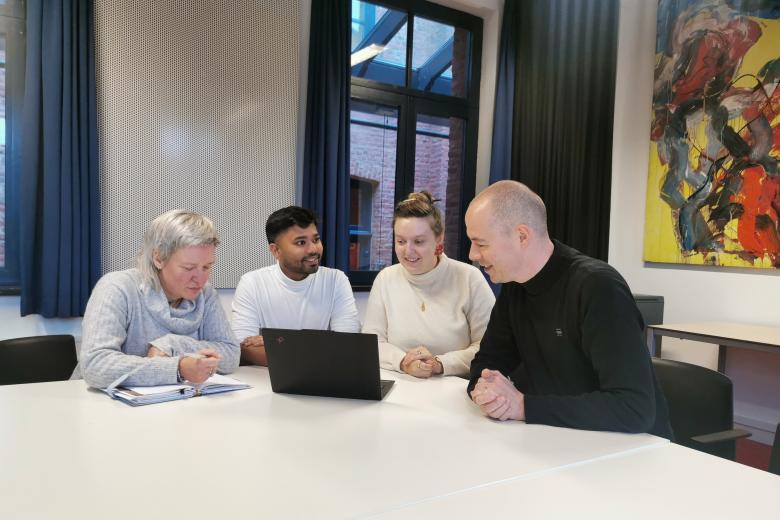
-
Celebrating 221 UM teachers who earned their University Teaching Qualification!
Educators from FHML (114), SBE (22), FSE (15), Law (33), FASoS (23), and FPN (14) have officially joined the ranks of UTQ-certified teachers.
-
If a machine can write a flawless essay, what’s left for the writer?
UCM graduate Robin van Wasen traces how writing has shaped her learning, identity, and voice, and asks whether AI, despite its fluency, can ever replace the intent, authenticity, and connection that define human writing.
